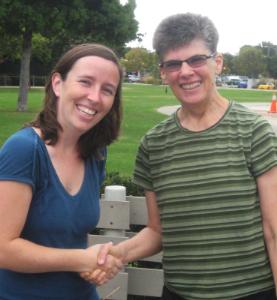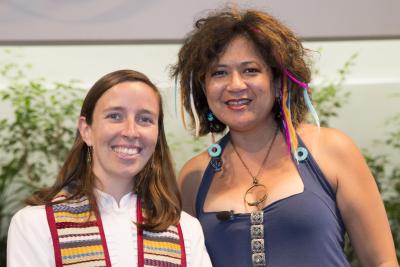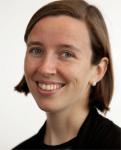From Our Minister Archive
 From Your President and Minister
From Your President and Minister
Visioning Questions
 Last July, before departing on six weeks of summer leave, I gave you all an invitation from my colleague Tom Owen-Toole, to cast your nets into the depths — the depths of life, and of faith. On the other side of that rewarding time of travel, childcare, reflection, housework, study, visiting other churches, and email, I am still wrestling with his words.
Last July, before departing on six weeks of summer leave, I gave you all an invitation from my colleague Tom Owen-Toole, to cast your nets into the depths — the depths of life, and of faith. On the other side of that rewarding time of travel, childcare, reflection, housework, study, visiting other churches, and email, I am still wrestling with his words.  Dear Friends,
Dear Friends,
The full life is full of many journeys: through space, through time, and through rites of passage. Courage is often required by those who begin and complete big journeys. [Telling stories about our journeys invites listeners] to consider and celebrate the journeys they’ve taken and those that still lie ahead.
– Aaron McEmrys, minister of our congregation in Santa Barbara
As our church year comes to a close, we are completing a journey we began together at our Ingathering services ten months ago. Since September, our babies have begun walking, our fifth graders have grown into middle schoolers, and our 8th graders have come of age. We have new classes of high school and college graduates to celebrate, as well as the families, parents, and grandparents who have cheered them along at every step on their journey. Congratulations to you all.
This summer, I hope you’ll continue your spiritual journey at church, as we swing into a season with some intentional differences from the academic church year. For many of us, the summer kick-off was on June 9, when a record 68 UUs from Greater LA (including 58 from this congregation) “prayed with their feet” by marching in the LA Pride Parade. From June 16 to September 2, our whole community comes together on Sunday mornings for one service at 10am. We have a few other changes to try out, as well. This July, Thursday choir rehearsal will morph into Wednesday SummerSings, led by DeReau Farrar, Director of Music, where we will celebrate hymns old and new and experiment with alternative approaches to community-created music. And in the place of age-separated Religious Exploration classes, our children will experience an all-ages Sunday summer camp, and twelve of our high schoolers and their advisors will head to New Orleans for a week-long service trip.
As the journeys of our children begin and end, so do our own. My hope is that the summer months are a time of (even) more reflection, connection, creativity, and spaciousness, in your lives, and at 18th and Arizona, your spiritual home.
See you at church,
Rev. Rebecca
PS: Your minister will be on study leave from July 10-August 5. Study leave allows ministers to read, reflect, study, write, and continue educational development of benefit to the ministry. During this time I am on-call for pastoral needs, although you will not see me in the pulpit or in committee meetings. From August 6 to 20, I will be on vacation and traveling with my family to the East Coast. During this time our Committee on Ministry (Kris Langabeer, Gerrie Lambson, Dan Patterson, and Alan Brunell) and Pastoral Care Team (Ron Crane, Michael Eselun, and Bronwen Jones) will be on-call for ministry and pastoral needs.
 This month’s column is limited to new material since the publication of my annual report to the congregation last month. That report included information on staff changes at UUCCSM during this last church year, information about the launch of our Small Group Ministry Program, and a review of life passages (births and deaths in our congregation).
This month’s column is limited to new material since the publication of my annual report to the congregation last month. That report included information on staff changes at UUCCSM during this last church year, information about the launch of our Small Group Ministry Program, and a review of life passages (births and deaths in our congregation). Dear Friends,
Dear Friends,
There are probably more efficient ways to organize a congregation than by asking all of our 370 voting members to show up, mostly in person, for our Annual Congregational Meeting. And I’m sure we could think of other ways to elect our leadership, approve our budget (most of which will be raised from our own pockets), tend to our facilities, and take a stand on the justice issues of our time.
But I’m not sure there are many other approaches to congregational life that would do as much to demonstrate our faith in democracy, and allow us to “practice our openness to the wisdom in every voice among us,” in the words of my colleague Heather Janules. I take a lot of pride in our way of doing things, and I appreciate the staff and volunteer leadership that allows our Annual Meeting to continue to be a meaningful, wise, and faithful gathering.
This year our goal is to provide a comprehensive Report on Programs at least a week before the Annual Meeting, so that you can learn more about the accomplishments, challenges, and hopes of fellow church members and staff who have served our congregation this year. Last year’s report included updates from more than 40 groups! My hope is that by May 12, electronic versions of this report will be posted on our website, and paper copies will be available at the church office and at coffee hour.
See you in church, and on May 19,
Rev. Rebecca
 Witnessing for Love
Witnessing for Love
 More than 10 years ago, President Bush memorably described an “Axis of Evil” in his State of the Union address. Since then, there have been more stories, more studies, and more books on evil.
More than 10 years ago, President Bush memorably described an “Axis of Evil” in his State of the Union address. Since then, there have been more stories, more studies, and more books on evil.
But that doesn’t mean evil is easy to talk about — or should be easy to talk about.
In modern history, the term “evil” is most closely associated with the Holocaust. This is the event to which all other horrors are most reliably compared, for better or for worse. But evil cannot be so neatly defined and confined, writes philosopher Susan Neiman.
She believes thinkers of every age have called “evil” that which “shatters our trust in the world,” an experience that is not only global or historical, but also, devastatingly, individual, personal, and inter-personal. “Evil is not mysterious, not insignificant, and not rare,” writes Rebecca Parker, liberal theologian and president of Starr King School for the Ministry, our UU seminary in Berkeley, CA. “It is ordinary, life-destroying, and pervasive.”
It seems to me that talking about evil, much less undoing evil, is ground where I have feared to tread — along with a host of religious liberals and pluralists. Have we abandoned the language of evil and left it in “morally unscrupulous hands,” as Neiman believes? What does evil mean to you? How do you understand evil at work in the world or in the human heart — and with what tools will we resist, interrupt, and unmask it?
These are deep waters. I hope you will dive in with me and your fellow church members as we wrestle with evil this month.
Much heart,
Rev. Rebecca
 More than 10 years ago, President Bush memorably described an “Axis of Evil” in his State of the Union address. Since then, there have been more stories, more studies, and more books on evil.
More than 10 years ago, President Bush memorably described an “Axis of Evil” in his State of the Union address. Since then, there have been more stories, more studies, and more books on evil.
But that doesn’t mean evil is easy to talk about — or should be easy to talk about.
In modern history, the term “evil” is most closely associated with the Holocaust. This is the event to which all other horrors are most reliably compared, for better or for worse. But evil cannot be so neatly defined and confined, writes philosopher Susan Neiman.
She believes thinkers of every age have called “evil” that which “shatters our trust in the world,” an experience that is not only global or historical, but also, devastatingly, individual, personal, and inter-personal. “Evil is not mysterious, not insignificant, and not rare,” writes Rebecca Parker, liberal theologian and president of Starr King School for the Ministry, our UU seminary in Berkeley, CA. “It is ordinary, life-destroying, and pervasive.”
It seems to me that talking about evil, much less undoing evil, is ground where I have feared to tread — along with a host of religious liberals and pluralists. Have we abandoned the language of evil and left it in “morally unscrupulous hands,” as Neiman believes? What does evil mean to you? How do you understand evil at work in the world or in the human heart — and with what tools will we resist, interrupt, and unmask it?
These are deep waters. I hope you will dive in with me and your fellow church members as we wrestle with evil this month.
Much heart,
Rev. Rebecca
 More than 10 years ago, President Bush memorably described an “Axis of Evil” in his State of the Union address. Since then, there have been more stories, more studies, and more books on evil.
More than 10 years ago, President Bush memorably described an “Axis of Evil” in his State of the Union address. Since then, there have been more stories, more studies, and more books on evil.
But that doesn’t mean evil is easy to talk about — or should be easy to talk about.
In modern history, the term “evil” is most closely associated with the Holocaust. This is the event to which all other horrors are most reliably compared, for better or for worse. But evil cannot be so neatly defined and confined, writes philosopher Susan Neiman.
She believes thinkers of every age have called “evil” that which “shatters our trust in the world,” an experience that is not only global or historical, but also, devastatingly, individual, personal, and inter-personal. “Evil is not mysterious, not insignificant, and not rare,” writes Rebecca Parker, liberal theologian and president of Starr King School for the Ministry, our UU seminary in Berkeley, CA. “It is ordinary, life-destroying, and pervasive.”
It seems to me that talking about evil, much less undoing evil, is ground where I have feared to tread — along with a host of religious liberals and pluralists. Have we abandoned the language of evil and left it in “morally unscrupulous hands,” as Neiman believes? What does evil mean to you? How do you understand evil at work in the world or in the human heart — and with what tools will we resist, interrupt, and unmask it?
These are deep waters. I hope you will dive in with me and your fellow church members as we wrestle with evil this month.
Much heart,
Rev. Rebecca
 Dear friends,
Dear friends,
